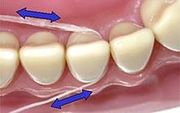Get the Facts on Flossing: Patents, History & The Great Debate

To floss, or not to floss? That is the question. At least, it is now thanks to a recent report published by the Associated Press. Early last month, the popular news organization found that there was little scientific evidence that flossing aids in the prevention of tooth decay and gum disease, spawning an epic dental debate.
For centuries now, dentists have promoted floss as a key weapon against plaque buildup, a staple of oral hygiene. Levi Spear Parmly, a dentist in New Orleans during the early 1800s, is often credited with its invention, still hailed by some as a pioneer of dental hygiene. It was in his book, A Practical Guide to the Management of the Teeth, that he first described the use of “waxed silken thread…passed through the interstices of the teeth…to dislodge that irritating matter which no brush can remove.”
Though the first floss-related patent was awarded in 1874 to Asahel Shurtleff of the dental supply company Codman Shurtleff for “An improved pocket thread carrier and cutter,” the first patent covering dental floss was actually attributed to Johnson Johnson in 1898.
Since then, the textures and materials comprising dental floss have varied, helping it transform into what is now a billion dollar industry. And thanks to patents like Whalen Biomedical Inc’s for a “Medicated dental floss and method of preparation” that would help fight the bacteria often associated with gingivitis, and Procter Gamble Co’s for a small, disposable “Dental Floss Pick,” there are more options than ever.
Studies might show that the evidence for flossing is “weak, very unreliable,” etc. But dentists everywhere and organizations like the American Dental Association stand by claims that flossing is still important to oral health. What do you think?
